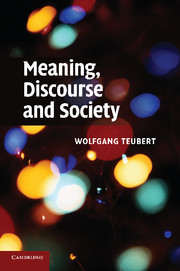Conclusion
Published online by Cambridge University Press: 04 August 2010
Summary
Authorship, intentionality and mental states: can the quest for meaning dispense with the investigation of the solitary mind?
In this book, I have presented my ideas on meaning, discourse and society. Meaning, I have said, is to be found only in the discourse. If it is also in people's heads, we would not have access to it there. Our quest for meaning would not be helped by an attempt to construe a monadic mind endowed with a mechanism for processing mental states. My contention is two-fold: first, there is no such object as the ‘mind’ whose workings we might observe directly. If there are mental representations of what is said, we do not have direct access to them. We have to rely on what people tell us about them. What we then get, are people's contributions to a discourse, thus part of the discourse, and not the mental representations themselves. Second, as long as mental representations are confined to the mind and not expressed in any kind of behaviour, including symbolic behaviour, they are meaningless. What someone feels inside but studiously refrains from expressing in any form cannot have an effect on society. It is irrelevant. This leads us, I believe, to the unavoidable conclusion that whatever is said about a person's intentions cannot be based on knowledge of that person's mental states. We have no way of knowing what it is that made a person express herself in a certain way.
- Type
- Chapter
- Information
- Meaning, Discourse and Society , pp. 241 - 272Publisher: Cambridge University PressPrint publication year: 2010

